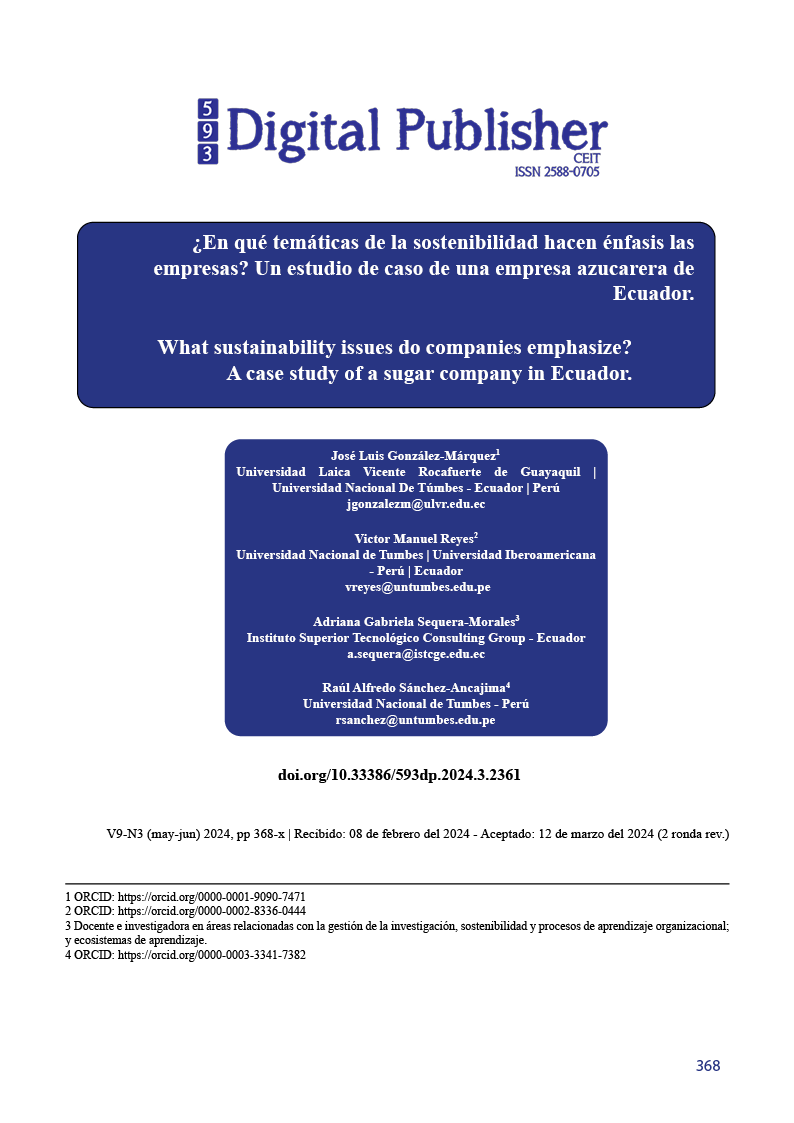What sustainability issues do companies emphasize? A case study of a sugar company in Ecuador.
Main Article Content
Abstract
Sustainability is understood as the dominant paradigm of the present century, where it has become a requirement for organizations. In this work, sustainable performance is explored and similar and homogeneous clusters are configured to summarize the sustainability report of a sugar company in Ecuador. Sustainability Reports were reviewed, corresponding to the period 2012 - 2022, which were analyzed in terms of social, economic and environmental components. The work had an explanatory and multivariate design. The exploration of performance through an ordinal scale, shows that they comply with the guidelines of the "triple button line", evidencing a comprehensive report, where economic aspects (GRI-200 series), social impact (GRI-400 series) are highlighted. They also report on environmental metrics (GRI-300 series). The performance evaluated to the company was carried out based on GRI indicators, from which an average performance is derived, which has been increasing in terms of improvements and number of contents, since 2012. The 18 contents were grouped into two clusters (Student's t: p-value. <0.05). The first explains 56.98% of the variance. The second cluster/factor had an explained variance of 36.81%. The cumulative total was 93.79% of variance explained, which is a high value. Because of what is left unexplained, there is a need to incorporate other variables into multivariate studies. It is necessary to explore and incorporate other variables into the multivariate studies. Other factors must be explored and incorporated in order to improve the model.
Key words: environment, organization, sustainability.
Downloads
Article Details

This work is licensed under a Creative Commons Attribution-NonCommercial-ShareAlike 4.0 International License.
1. Derechos de autor
Las obras que se publican en 593 Digital Publisher CEIT están sujetas a los siguientes términos:
1.1. 593 Digital Publisher CEIT, conserva los derechos patrimoniales (copyright) de las obras publicadas, favorece y permite la reutilización de las mismas bajo la licencia Licencia Creative Commons 4.0 de Reconocimiento-NoComercial-CompartirIgual 4.0, por lo cual se pueden copiar, usar, difundir, transmitir y exponer públicamente, siempre que:
1.1.a. Se cite la autoría y fuente original de su publicación (revista, editorial, URL).
1.1.b. No se usen para fines comerciales u onerosos.
1.1.c. Se mencione la existencia y especificaciones de esta licencia de uso.
References
Alhassan, I., Islam, K. M. A., & Haque, M. S. (2021). Sustainability reporting and financial performance of listed industrial goods sector in Nigeria. International Journal of Accounting & Finance Review, 9(1), 46-56. https://doi.org/10.46281/ijafr.v9i1.1541
Arıoğlu Akan, M. Ö., & Ayçim Selam, A. A. (2018). Assessment of Social Sustainability Using Social Society Index: A Clustering Application. European Journal of Sustainable Development, 7(1), Article 1. https://doi.org/10.14207/ejsd.2018.v7n1p412
Barney, J. (1991). Firm Resources and Sustained Competitive Advantage. Journal of Management, 17(1), 99–120. https://doi.org/10.1177/014920639101700108
Carroll, A. B. (1991). The pyramid of corporate social responsibility: Toward the moral management of organizational stakeholders. Business Horizons, 34(4), 39-48. https://doi.org/10.1016/0007-6813(91)90005-G
CONCYTEC. (2018). REGLAMENTO DE CALIFICACIÓN, CLASIFICACIÓN Y REGISTRO DE LOS INVESTIGADORES DEL SISTEMA NACIONAL DE CIENCIA, TECNOLOGÍA E INNOVACIÓN TECNOLÓGICA - REGLAMENTO RENACYT. CONCYTEC - Perú. https://portal.concytec.gob.pe/images/renacyt/reglamento_renacyt_version_final.pdf
Consorcio Ecuatoriano para la Responsabilidad Social & Sostenibilidad. (2022). Memorias de Sostenibilidad. CERES. https://www.redceres.com/memoria
Deegan, C. (2000). Financial Accounting Theory, Beijing: Mc Graw Hill.
Elkington, J (1998). Cannibals with Forks: The Triple Bottom Line of 21st Century. Business, New Society.12
Flores, B., Reyes, V. M., & Ezcurra, G. (2022). Responsabilidad Social Empresarial y sostenibilidad en el sector bancario. Revista de Investigación, 46(106), 14-36. https://revistas.upel.edu.ve/index.php/revinvest
Franco, S. (2021). The influence of the external and internal environments of multinational enterprises on the sustainability commitment of their subsidiaries: A cluster analysis. Journal of Cleaner Production, 297, 126654. https://doi.org/10.1016/j.jclepro.2021.126654
Freeman, R.E. (1984). Strategic Management, A Stakeholder Approach. Pitman Publishing Inc, Massachusetts.
Gallardo-Gordón, M. & Galarza-Torres, S. (2019). Relationship between Corporate Social Responsibility and Financial Performance in Ecuadorian Companies that have Sustainability Reports from the 2014 to 2018 Period. X-Pedientes Económicos, Vol. 3 (7), pp. 38-56
García Samaniego, J. M., & Quezada Pardo, A. del C. (2021). La asociatividad, sustentabilidad y certificaciones en la producción cafetalera en el sur del Ecuador. Economía Coyuntural, 6(2), 33-59.
Global Reporting Initiative. (2022). Conjunto Consolidado de Estándares GRI para la Elaboración de Informes de Sostenibilidad. Obtenido de Global Reporting Initiative: https://www.globalreporting.org/standards/gri-standards-translations/gri-standards-spanish-translations-download-center/
Godha, A., & Jain, P. (2015). Sustainability Reporting Trend in Indian Companies as per GRI Framework: A Comparative Study. South Asian Journal of Business and Management Cases, 4, 62-73. https://doi.org/10.1177/2277977915574040
Gonzabay Núñez, J. C., Reyes, V. M., Herrera Brunett, G. A., Deza Navarrete, C. A., Rojas Lujan, V. W., & Sequera Morales, A. G. (2020). Análisis de la sostenibilidad de una empresa de caña de azúcar en Ecuador. Research, Society and Development, 9(11), e76091110538-e76091110538. https://doi.org/10.33448/rsd-v9i11.10538
GRI - Global Reporting Initiative (2018). Global Reporting. Globalreporting.org. https://www.globalreporting.org/resourcelibrary/Spanish-G4-Part-One.pdf
Hahn, R., & Lülfs, R. (2014). Legitimizing Negative Aspects in GRI-Oriented Sustainability Reporting: A Qualitative Analysis of Corporate Disclosure Strategies. Journal of Business Ethics, 123(3), 401-420. https://doi.org/10.1007/s10551-013-1801-4
Hair, J. F., Anderson, R. E., Tatham, R. L., & Black, W. C. (1998). Multivariate data analysis. Englewood Cliffs, NJ: Prentice Hall.
Hair, J. F., Black, W. C., Badin, B. J., Anderson, R. E., & Ronald, L. T. (2006). Multivariate data analysis (6th ed.). Upper Saddle River, NJ: Pearson/Prentice Hall.
Hernández Pajares, J. (2018). Influencia de la naturaleza internacional de empresas peruanas en su información de sostenibilidad. Revista de Comunicación, 17(1), 1-17.
Hernández Pajares, J., & Yagui Nishii, V. (2021). Análisis de información y factores de desempeño ambiental y de economía circular en empresas peruanas. Comuni@cción: Revista De Investigación En Comunicación Y Desarrollo, 12(1), 37–52. https://doi.org/10.33595/2226-1478.12.1.481
Hernández, R., Fernández, C., & Baptista, M. (2014). Metodología de la investigación. Mc Graw - Hill.
Hubbard, P. (2008). Regulating the social impacts of studentification: A Loughborough case study. Environment and Planning A, 40(2): 323-341. DOI : 10.1068/a396
Kerlinger, F., & Lee, H. (2002). Investigación del comportamiento. Métodos de investigación en ciencias sociales (4ta.). Mc Graw - Hill.
Ketchen D. J., Shook C. L. (1996). The application of cluster analysis in strategic management research: An analysis and critique. Strategic Management Journal, 17, 441-459.
López-Roldán, P., & Fachelli, S. (2015). Metodología de construcción de tipologías para el análisis de la realidad social. https://ddd.uab.cat/record/118082
Martínez Ávila, M. (2021). Análisis factorial confirmatorio: un modelo de gestión del conocimiento en la universidad pública. RIDE Revista iberoamericana para la investigación y el desarrollo educativo, 12(23). https://doi.org/10.23913/ride.v12i23.1103
Motwani, S., & Pandya, H. (2016). A Study of Sustainable Disclosure Practices of Indian Corporates. IRA-International Journal of Management & Social Sciences (ISSN 2455-2267), 4(1). doi: http://dx.doi.org/10.21013/jmss.v4.n1.p13
Oncioiu, I.; Petrescu, A.-G.; Bîlcan, F.-R.; Petrescu, M.; Popescu, D.-M.; Anghel, E. (2020). Corporate Sustainability Reporting and Financial Performance. Sustainability, 12, 4297. https://doi.org/10.3390/su12104297
Ovelar-Fernández, W. (2019). ANÁLISIS DE LAS MEMORIAS DE SUSTENTABILIDAD DE LAS ORGANIZACIONES PARAGUAYAS. Rev. Int. Investig. Cienc. Soc.15 (2), 161-183.
Pacto Global Red Ecuador. (2017). Pacto Global Red Ecuador. http://www.pactoglobal-ecuador.org/red-pacto-global-ecuador/
Pizarro Romero, K., & Martínez Mora, O. (2020). Análisis factorial exploratorio mediante el uso de las medidas de adecuación muestral kmo y esfericidad de bartlett para determinar factores principales. Journal of Science and Research, 5(CININGEC), 903–924. https://revistas.utb.edu.ec/index.php/sr/article/view/1046
Porter, M. E. & Kramer, M. R. (2002). The competitive advantage of corporate philanthropy. Harvard Business Review, 80(12), 56-68, 133. https://pubmed.ncbi.nlm.nih.gov/12510538/
Preciado, M., Reyes, V. M., & Sandoval Rodríguez, O. (2021). SOSTENIBILIDAD Y RESPONSABILIDAD SOCIAL EN LAS UNIVERSIDADES PERUANAS. Revista de Investigación y Postgrado. 36 (2) https://revistas.upel.edu.ve/index.php/revinpost/article/view/9679
Revelli, C., & Viviani, J. L. (2015). Financial performance of socially responsible investing (SRI): What have we learned? A meta-analysis. Business Ethics, 24(2), 158-185. https://doi.org/10.1111/beer.12076
Reyes, V. M., Gonzabay Núñez, J. C., Herrera Brunett, G. A., Deza Navarrete, C. A., (2022). Factores determinantes de la sostenibilidad en una empresa cañicultora del Ecuador. Revista de Ciencias Sociales. XXVIII, (1), 288-302. DOI: https://doi.org/10.31876/rcs.v28i1.37692
Rodrigue, M., Magnan, M., & Boulianne, E. (2013). Stakeholders’ influence on environmental strategy and performance indicators: A managerial perspective. Management Accounting Research, 24(4), 301-316. https://doi.org/10.1016/j.mar.2013.06.004
Rodríguez Guerra, L. C., & Ríos-Osorio, L. A. (2016). Evaluación de Sostenibilidad con metodología GRI. Dimensión Empresarial, 14(2), 73-89. https://doi.org/10.15665/rde.v14i2.659
Rojas Gómez, J. C., Niño Galeano, C. L., & Solano Bejarano, S. D. (2019). Comportamiento de Divulgación de Indicadores GRI – G4 en Reportes de Sostenibilidad de Empresas del Sector Agricultura. Revista De Economía Y Estadística, 57(1), 27–56. https://doi.org/10.55444/2451.7321.2019.v57.n1.31311
Rubio-Andrés, M., & Abril, C. (2023). Sustainability oriented innovation and organizational values: A cluster analysis. The Journal of Technology Transfer. https://doi.org/10.1007/s10961-022-09979-1
Santos, C. P., & León Saltos, A. C. (2019). LA MEDICIÓN DE LOS RESULTADOS SOCIALES EN EL SECTOR BANANERO; UN ESTUDIO DE CORTE TRANSVERSAL EN LA PROVINCIA DE LOS RÍOS, REPÚBLICA DEL ECUADOR. Universidad Ciencia y Tecnología, 23(93), 12-30.
Shen, C.; Fang, B.; Zhou, X. The Relationship between Corporate Sustainable Development Performance, Investor Sentiment, and Managerial Overconfidence. Sustainability 2022, 14, 10606. https://doi.org/10.3390/ su141710606
Ssebunya, B. R., Schader, C., Baumgart, L., Landert, J., Altenbuchner, C., Schmid, E., & Stolze, M. (2019). Sustainability Performance of Certified and Non-certified Smallholder Coffee Farms in Uganda. Ecological Economics, 156 (September), 35-47. https://doi.org/10.1016/j.ecolecon.2018.09.004
Superintendencia de Compañías, Valores y Seguros – SCVS (2023). información de los Estados Financieros presentados bajo el estado de compañías activas. SCVS.
Tello Caicedo, G. E., Agila Maldonado, M. V., Legarda Arreaga, C., Tello Caicedo, G. E., Agila Maldonado, M. V., & Legarda Arreaga, C. (2018). La responsabilidad social empresarial corporativa y su incidencia en el ámbito laboral en Ecuador. Revista Universidad y Sociedad, 10(5), 60-69.
Véliz, M. A., Torres, S. L., & Cantos, J. B. (2018). La responsabilidad social corporativa y su rol en las empresas ecuatorianas1. Revista Lasallista de Investigación, 15(2), 105-117. https://doi.org/10.22507/rli.v15n2a8
Wilches S., A., Orozco, L. A., & Beltrán-Torres, C. Y. (2020). Estructura de las juntas directivas y divulgación de la responsabilidad social corporativa: el caso de las empresas más reputadas en Colombia. Cuadernos de Administración, 33. https://doi.org/10.11144/Javeriana.cao33.ejdd
Zeng, S. X., Liu, H. C., Tam, C. M., & Shao, Y. K. (2008). Cluster analysis for studying industrial sustainability: An empirical study in Shanghai. Journal of Cleaner Production, 16(10), 1090-1097. https://doi.org/10.1016/j.jclepro.2007.06.004





